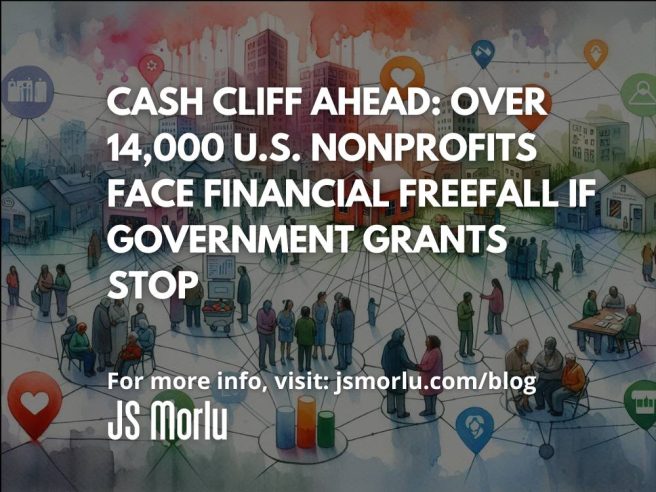By: John S. Morlu II, CPA
Imagine waking up to find your local food bank closed, your community health clinic shuttered, and the tutoring center your children rely on dissolved overnight. That dystopian scenario could become reality for millions of Americans if current federal grant funding to nonprofits is disrupted — even temporarily.
Recent projections by nonprofit data intelligence firm Candid paint a stark picture: more than 14,000 U.S. nonprofits could run out of cash within just three months if government grant flows were halted today. The ripple effect? An estimated 2.8 million nonprofit sector jobs at risk, with far-reaching consequences for education, housing, health, social services, and arts programs across the country.
A Fragile Safety Net: The Overdependence on Government Grants
For many nonprofits, government grants are not just supplemental—they are the lifeline. According to Candid’s research:
- 35,000+ nonprofits rely on government grants for over 50% of their total revenue
- In states like New York, over 1,300 nonprofits are within 90 days of insolvency if grants stop
- 361,000 nonprofit jobs are at immediate risk in New York State alone
“Nonprofits aren’t just nice to have—they’re essential infrastructure,” said Cathleen Clerkin, Ph.D., Candid’s Associate VP of Research. “The government may write the checks, but nonprofits execute the mission. When that funding dries up, so do vital services.”
Which Sectors Are on the Brink?
The nonprofit sectors most vulnerable to a funding freeze include:
- 🏥 Human Services (child protection, food banks, mental health)
- 🏘 Housing and Shelter (emergency housing, domestic violence centers)
- 📚 Education (tutoring, adult literacy, after-school programming)
- 🎭 Arts and Humanities (community theater, museum education, public libraries)
A 2024 study by the Urban Institute found that 52% of nonprofits operating in these sectors had less than 90 days of operating cash on hand — even with current grant support. Without it? Many would collapse within weeks.
Real-World Impact: The Domino Effect in Action
Case Study: Community Roots Mental Health Center – Illinois
This small behavioral health nonprofit serves 1,800 low-income patients per year in rural and underserved counties. Over 75% of its budget comes from state and federal mental health grants. In early 2023, a temporary suspension of funding during budget negotiations forced the center to furlough staff, cancel therapy sessions, and put 400 clients on a waitlist.
“We’re running a trauma recovery program with trauma-inducing levels of uncertainty,” said Executive Director Lisa Harman. “The community can’t heal if we’re constantly trying to survive.”
Why So Many Are This Vulnerable
There’s a brutal financial reality underlying the nonprofit world:
- Only 29% of U.S. nonprofits have more than three months of cash reserves, according to the National Council of Nonprofits
- Unrestricted funding remains rare, with over 60% of donations restricted to specific programs or outcomes
- Small to mid-sized nonprofits (budgets <$5 million) often lack dedicated finance staff or fundraising teams
The result is a sector rich in compassion but chronically poor in liquidity.
The National Stakes: Why Policymakers Should Care
When a nonprofit goes under, it’s not just a bookkeeping loss—it’s a community failure:
- Children lose access to after-school care
- Seniors lose meal deliveries and mobility support
- Veterans lose mental health counseling
- Underserved neighborhoods lose access to arts, culture, and educational opportunity
Nonprofits account for 10.2% of the U.S. private workforce — more than the construction and transportation sectors combined. A mass funding failure would unleash economic and social consequences at scale.
What Can Be Done Right Now?
1. Scenario Planning
Nonprofits should work with external CPAs and CFOs to model worst-case funding shortfalls and develop tiered contingency plans.
2. Diversify Revenue Streams
Reliance on government funding is risky. Nonprofits must build strategies to grow individual donations, foundation grants, and earned income programs.
3. Use Technology to Reduce Cost
Cloud-based accounting systems like FinovatePro can lower admin costs, automate compliance, and improve transparency—boosting trust among funders.
4. Advocate Collectively
It’s time for nonprofits to lobby as a united sector. State associations and national coalitions must pressure legislators to stabilize nonprofit funding, especially in an election year.
Candid’s Call to Action
Candid, born from the 2019 merger of GuideStar and the Foundation Center, is providing free tools and data dashboards to help nonprofits assess risk and identify alternative funding sources.
CEO Ann Mei Chang underscores the urgency: “When nonprofits go under or cut services, it’s the most vulnerable people who suffer. We need data, partnerships, and proactive action to protect the sector.”
Final Word
The nonprofit world isn’t facing a funding dip — it’s facing a potential freefall. With over 14,000 nonprofits at risk of running out of cash, the next 90 days may define the sector’s next 10 years.
Mission-driven doesn’t mean immune. To survive this moment, nonprofits must lead with strategy, not just hope.
Author: John S. Morlu II, CPA is the CEO & Chief Strategist of JS Morlu, a globally acclaimed public accounting and management consulting powerhouse.
Through cutting-edge technology and data-driven strategy, JS Morlu helps organizations operate with clarity, control, and compliance.
– ReckSoft (www.recksoft.com ): AI-powered reconciliation for nonprofit and donor accounting
– FinovatePro (www.finovatepro.com ): Cloud accounting for donor-driven missions
– Fixaars (www.fixaars.com ): Empowering nonprofits with maintenance and repair logistics
JS Morlu LLC is a top-tier accounting firm based in Woodbridge, Virginia, with a team of highly experienced and qualified CPAs and business advisors. We are dedicated to providing comprehensive accounting, tax, and business advisory services to clients throughout the Washington, D.C. Metro Area and the surrounding regions. With over a decade of experience, we have cultivated a deep understanding of our clients’ needs and aspirations. We recognize that our clients seek more than just value-added accounting services; they seek a trusted partner who can guide them towards achieving their business goals and personal financial well-being.
Talk to us || What our clients says about us





